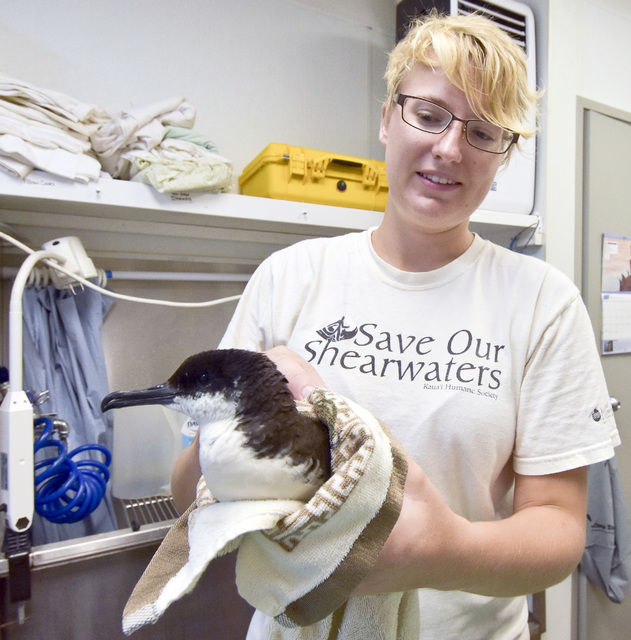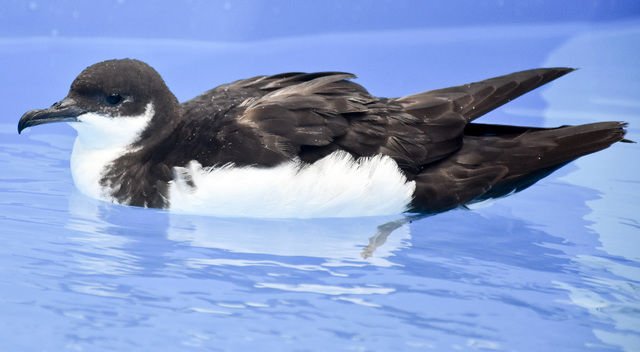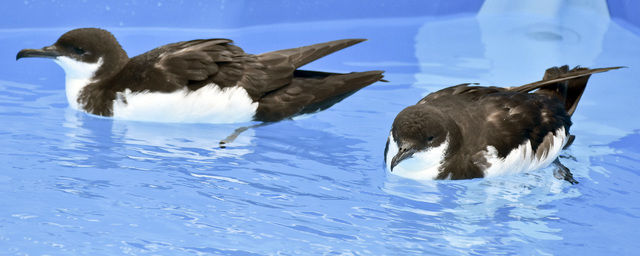LIHUE — More than 100 endangered seabirds recently required care after falling from the sky due to lighting issues at Kokee State Park.
A majority of the adult birds were Newell’s shearwaters, along with a few Hawaiian petrels. About 80 were injured this week around the Kokee Air Force station, and nine died. Officials said faulty light positioning at the tracking facility likely reflected off dense fog and created poor navigability and resulted in collisions and falls.
“This is very, very unusual,” said Aaron Nadig, island team manager with the U.S. Fish and Wildlife Services in Honolulu. “Usually, when we see falling birds, it’s the fledgling season.”
Fledgling season begins Tuesday and runs to Dec. 15. It’s the time of year newly born shearwaters fly out to the ocean for the first time. The endangered bird, which navigates over land at night, can be distracted by lights to the point of flying into manmade objects or disorienting themselves to the point of exhaustion. Either way, if they fall to the ground, they become vulnerable to predators or moving vehicles.
But the 114 grounded birds as of Friday are adults. Experienced fliers like those don’t get disoriented as easily, especially not in big numbers.
“Adults falling from light attraction is very unusual,” Nadig said. “All of us, including the Air Force, want to fix this right away.”
A multi-agency collaboration is underway to treat the injured birds and fix the lighting problem, including the U.S. Fish and Wildlife, the Kokee Air Force Station, Kauai Endangered Species Recovery Program and Kauai Division of Forestry and Wildlife.
Nadig said the Air Force facility had a few lights that weren’t positioned correctly. The lights should have been pointed directly at the ground, as not to reflect in the skies, but some of them weren’t. He said the facility switched over to green lights in 2011 and upgraded the facility the following year.
USFWS hadn’t followed up with the facility but is working with the Air Force to fix the problem. The Air Force, which didn’t return a message seeking comment, has been shutting down its lights as the groups address the problem.
Weather could be a factor, too. The area has been covered in dense fog, along with rain and humidity.
“It’s a light attraction that’s been exacerbated by the fog,” Nadig said.
The birds are being treated at the Kauai Humane Society though its Save Our Shearwater program.
Penny Cistaro, KHS director, said the high number of birds needing care put a strain on KHS staff, but most of the injured animals have been treated and released. Some just needed to be hydrated after flying so long before falling.
“The staff was able to triage, get them in, get them out and get them released,” she said. “Some of them just needed time to regroup.”
Around 20,000 shearwaters live around Kauai, accounting for 90 percent of the bird’s population. They can live to be about 30 years old and remain with a partner for life. The first two black and white birds fell Aug. 15, but around 80 dropped between Tuesday and Friday.
Tracy Anderson, SOS program coordinator, said the group would usually treat around a dozen felled adult shearwaters before the start of the fledgling season.
“It was a very big shock, but we were able to mobilize and get things going,” she said. “The team has been working well.”
Eight of the birds were dead upon arrival at KHS. One succumbed to injuries at the site. A handful of birds arrived at the humane society Saturday, but hadn’t been evaluated or counted in the population by early afternoon. The majority have been released. Around 16 birds were still at the facility Saturday.
Seasonal technicians were hired last week to prepare for fledgling season, but instead of regular training, they learned the SOS aid ropes through a crash course.
“This was trial by fire for them,” Anderson said.
Beginning Tuesday, aid stations will be set up around the island, including all fire stations. If someone should come across a felled bird, pick it up gently with a small towel and place it in a ventilated box and put it in one of the cubbies. Write down where it was found and call SOS hotline, 635-5117.







